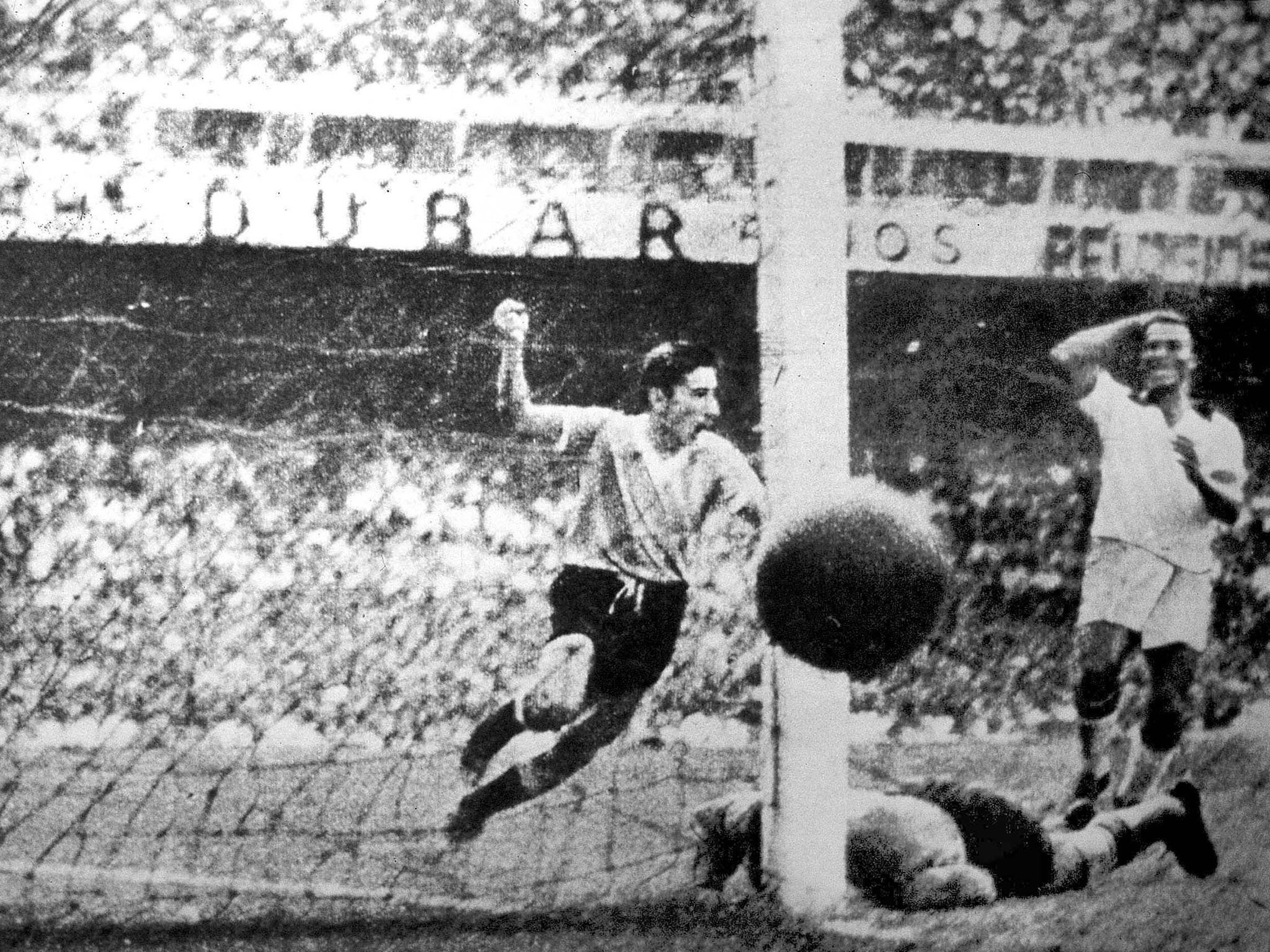Alcides Ghiggia: Footballer who broke millions of Brazilian hearts when he scored the goal that won the 1950 World Cup for Uruguay
The result was one of the greatest upsets in World Cup history

It was perhaps fitting that Alcides Ghiggia died on the 65th anniversary of his goal which snatched the 1950 World Cup from the hosts and hot favourites Brazil in the cauldron of the Maracana stadium in Rio de Janeiro. It was a goal which broke millions of Brazilian hearts and is still mourned every year by many diehards in Brazil on 16 July. Known in Portuguese as O Maracanaço (roughly translated as “The Great Maracana Disaster”), it was one of the greatest upsets in World Cup history.
Due to the Second World War, it had been the first World Cup since 1938. The hosts and Uruguay were level at 1-1 with 11 minutes to go; under the round-robin format of the time, Brazil needed only a draw to take the title. Then Ghiggia, indeed the entire Uruguayan team, ensured legendary status in their nation for the rest of their lives. He was the last survivor of the side.
In the 79th minute of the final, almost 200,000 mostly Brazilians fans in the stadium, and millions more on the radio, were already celebrating when the speedy No 7, Ghiggia, received a pass. The next few seconds remain the clearest memory of his life. “I took the ball on the right,” he recalled, words repeated thousands of times over the years. “I dribbled past Bigode [the Brazilian left-back] and entered the box. The goalkeeper [Moacir Barbosa] thought I was going to cross it, as I had done for our first goal, so he left a gap between himself and the near post. I just had a second so I shot low between goalkeeper and post and it hit the back of the net even before he dived.” All but the 40 or so Uruguayans in the crowd fell into a deathly hush.
“There was complete silence,” he recalled. “The crowd were frozen still. It was as if they weren’t even breathing. Sometimes I feel as though I was Brazil’s ghost, always there in their memories. Only three people have silenced the Maracana – the Pope, Frank Sinatra and me.”
Uruguay held on to take the World Cup for the second time: they had won the inaugural tournament as hosts in Montevideo in 1930, when only 13 nations took part.
Brazilians old enough to remember O Maracanaço certainly still do. The late and controversial Brazilian playwright Nelson Rodrigues once went over the top and beyond good taste when he described it as “an irremediable national catastrophe, our Hiroshima.” Every 16 July elderly Brazilian football fans, and their younger family members, get together to analyse and “mourn” that day in 1950. It was after that fateful day, when the Brazilian side played in white strips and blue collars, that the now-famous yellow and green strips were born; the old colours were seen as bringing bad luck.
The goalkeeper Barbosa became a scapegoat and would play only once more for the national side. He became something of a pariah: “In Brazil, the maximum penalty for a crime is 30 years,” he told reporters shortly before he died in 2000: “I’ve spent 50 years paying for a crime I didn’t even commit.”
Ghiggia got to know Barbosa and sympathised. “Goalkeepers always take the rap. Why didn’t they blame my marker?” In contrast, Ghiggia and his side became national heroes and, after retiring from football, were all given good jobs and a pension by the Uruguayan government. Ghiggia became a casino security man. After their World Cup win, he recalled, “we had a whip-round among the players and bought some sandwiches and beer.”
Ghiggia, of Italian descent, played for two more years for the national side and Peñarol before becoming one of the first South American players to move to Europe. For eight years from 1952, he played for Roma in Italy, scoring 19 goals in 200 appearances. His highest finish with Roma in Serie A was third.
Partly because of his Italian roots, he gained Italian citizenship in 1957 and played for the Azzurri in the qualifying rounds of the 1958 World Cup, scoring once in five matches. Unfortunately, it was the only time Italy did not qualify for the final stages. He played for Milan in the 1961-62 season, along with Giovanni Trapattoni, future coach of Italy and, more recently, of the Republic of Ireland, and the teenage prodigy Gianni Rivera, before returning to Uruguay to play for the Danubio club, retiring in 1968 at the age of 41.
Despite his special pension, times became hard and Ghiggia was forced to sell his World Cup winner’s medal, but a sympathetic businessman bought it and gave it back to him. He also worked part-time as a driving instructor and late in life married one of his learners, Beatriz Masui, 45 years his junior.
Alcides (a Hispanic version of Heracles, or Hercules) Edgardo Ghiggia was born to Italian immigrant parents in Montevideo in 1926. He died of a heart attack in Las Piedras, just north of the capital, where he had spent his latter years. He is survived by his third wife Beatriz, his son Arcadio and daughter Lilian from his first marriage, five grandchildren and two great-grandchildren. The Uruguayan president Tabare Vazquez declared three days of national mourning in his honour.
Alcides Edgardo Ghiggia, footballer: born Montevideo 22 December 1926; three times married (two children); died Las Piedras, Uruguay 16 July 2015.
Subscribe to Independent Premium to bookmark this article
Want to bookmark your favourite articles and stories to read or reference later? Start your Independent Premium subscription today.

Join our commenting forum
Join thought-provoking conversations, follow other Independent readers and see their replies